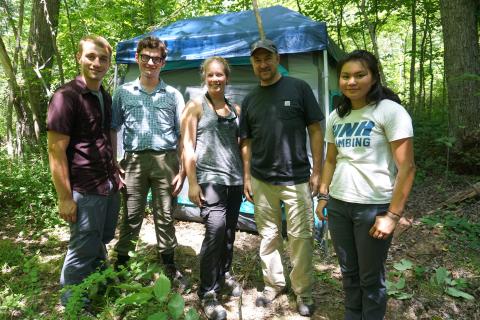
Jeff Garnas, assistant professor of forest ecosystem health in COLSA’s Department of Natural Resources and the Environment, joined COLSA’s faculty in 2016, following seven years at the University of Pretoria in South Africa. His current focus is on insects and pathogens that represent a threat to NH forests and beyond and how living in a highly interconnected world is impacting the ecology and evolution of forest systems.
COLSA: Please describe your area of expertise in nontechnical language.
Jeff Garnas: I study how native and introduced insects and pathogens influence the structure, function, and biodiversity of forest ecosystems. This includes understanding how these organisms interact with one another, with host trees, and with climate in ways that affect their abundance in the landscape and the damage that they cause. As a major component of the landscape both in New England and worldwide, healthy forests are key to a healthy planet.
COLSA: How would you explain what you do to someone unfamiliar with your work and field?
Garnas: I use a variety of tools to ask questions about the forest and the insects and microbes that inhabit it. These include field and lab experiments, observational studies, mathematical modeling and various genetic assays and analyses.
For example, we recently carried out a large field trial to examine how tiny wasps intentionally released to suppress populations of the invasive emerald ash borer find their prey, with the hope of informing the long-term management of this devastating insect. We are also studying the northward shift of the southern pine beetle to help understand the ecological causes and consequences of climate-driven changes in range.

COLSA: What draws you to your work?
Garnas: I love the forest, especially in the northeast. I am continually fascinated and amazed by the unique biology of the flora and fauna that surround us (including the very small stuff), which I am highly motivated to help conserve. Plus, as a scientist, I get to forever remain a student of the natural world in all its beauty and complexity.
COLSA: What do you love most about teaching at UNH and why?
Garnas: I really enjoy sharing my passion for the intricacies of nature as well as guiding students about how to effectively ask questions about the world via the process of science.
COLSA: Please describe your teaching style and what students who take your courses can expect.
Garnas: My courses are full of concepts, ideas, and examples. I challenge students to think creatively and independently. Students should expect to be pushed slightly out of their comfort zones but in a way that respects the process of learning and encourages them to reflect on their assumptions about the world.
COLSA: What do you wish others (colleagues, students) knew about what you do?
Garnas: That being a good naturalist is as important to me as being a good scientist, but that the pursuit of both is lifelong.
COLSA: If you could share one piece of advice with students, what would it be?
Garnas: How about three things of a piece: Learn to read deeply. Learn to write. Think broadly and creatively about what is most meaningful to you and focus your efforts there.
COLSA: So far in your career, what do you consider to be your greatest achievement?
Garnas: Tough question! To date I have supervised or co-supervised 15 postgraduate students to completion of their degrees. These students have come from seven countries and three continents and have worked on a wide range of projects, all under the umbrella of forest health. This has been challenging but extremely rewarding!
COLSA: Finally, if you weren't doing this, what would you be doing?
Garnas: Wildlife photographer maybe? Marine biologist? Scuba diving instructor?